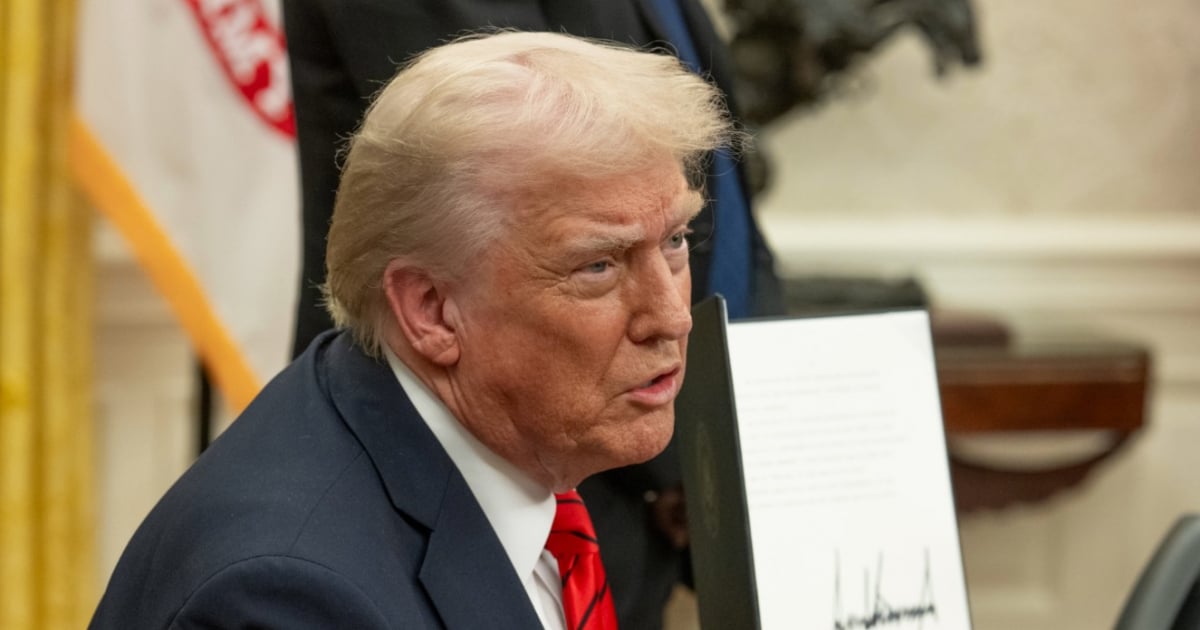
Related videos:
The President of the United States, Donald Trump, announced on Monday that starting April 2, tariffs on "external agricultural products" will take effect.
On his platform, Truth Social, Trump emphasized: “To the great farmers of the United States: Get ready to start producing a lot of agricultural products to be sold within the United States.”

Finally, the president stated: "Tariffs will be applied to external products on April 2. Have fun!"
According to information from AP, the measure includes a 25% tariff on imports from Canada and Mexico, in addition to doubling the taxes on Chinese products to 20%.
These three countries, which are the main trading partners of the U.S., have warned of possible retaliatory measures.
The press agency's report states that last year, the United States traded nearly 2.2 trillion dollars in goods with these countries: 840 billion dollars with Mexico, 762 billion with Canada, and 582 billion with China.
The implementation of these tariffs marks the most aggressive use of duties by the U.S. since the 1930s, with the argument that they will help curb illegal immigration and drug trafficking.
The sectors most affected by the tariffs imposed by Trump include the automotive industry, energy, electronics, food, and alcoholic beverages.
The measure will impact trade with Canada and Mexico, which in 2023 exported over $79 billion in vehicles to the U.S. from Mexico and $31 billion from Canada.
Car prices in the U.S. could increase by up to $3,000 due to reliance on imported components.
Canada, the largest crude oil supplier to the U.S., will face a 10% tariff on its energy exports, which could lead to an increase in gasoline prices, especially in the Midwest, reported AP.
Additionally, he emphasized that China, for its part, is a major supplier of electronic devices, clothing, and toys, and that the U.S. imported $32 billion in toys and sports goods from this nation in 2023, with tariffs potentially raising the prices of these products.
The tariffs will also impact the importation of tequila and Canadian whisky, which could lead to retaliation against American bourbon whisky.
Additionally, the prices of agricultural products such as fruits, vegetables, and Mexican avocados will rise, as 90% of the avocados sold in the U.S. come from Mexico.
U.S. farmers have expressed concern about possible retaliation from Canada and Mexico, which in the past have imposed tariffs on products such as soybeans and corn in response to Trump’s protectionist policies, emphasized AP.
Last Saturday, Trump dismissed concerns about the impact of the announced tariffs against several countries - including China, Canada, and Mexico - on product prices in the United States, claiming it is a "myth."
In response to concerns from Americans about rising prices, Trump stated that "it's a myth propagated by foreign countries that really don't like to pay tariffs."
Despite studies and analyses indicating that tariffs are ultimately absorbed by consumers, Trump continued to defend his position, arguing that the imposed tariffs do not have the negative economic effect they are attributed with.
On the other hand, last February, Trump confirmed that his administration will impose a 25% tariff on imports from the European Union.
During the first meeting of his Cabinet, the president justified this measure by claiming that Europe has maintained an unfair trade relationship with his country and accused the European bloc of having "exploited" the United States for years.
Frequently asked questions about the tariffs imposed by Trump
What are the new tariffs imposed by Trump on Canada, Mexico, and China?
Starting April 2, Trump will impose a 25% tariff on imports from Canada and Mexico, and will double the tariffs on Chinese products, raising them to 20%. These tariffs are part of a measure to protect the U.S. economy and reduce illegal immigration and drug trafficking.
How will these tariffs affect the economy of the United States?
Tariffs could increase the prices of products such as cars, gasoline, and electronic items. The automotive industry could face a rise of up to $3,000 in car prices due to reliance on imported components. The price of gasoline could also rise due to tariffs on Canadian oil.
What response have Canada and Mexico had to these tariffs?
Canada has announced retaliation tariffs of 25% on U.S. products, while Mexico has stated that it will take similar measures if necessary. Both countries believe that these tariffs are a strategic mistake that will impact their economies as well as that of the U.S.
Which sectors will be most affected by Trump's tariffs?
The most affected sectors include the automotive industry, energy, and electronics. Tariffs on imports of Canadian crude oil and the automotive industry could increase product prices and impact the competitiveness of these sectors in the U.S.
Filed under:





